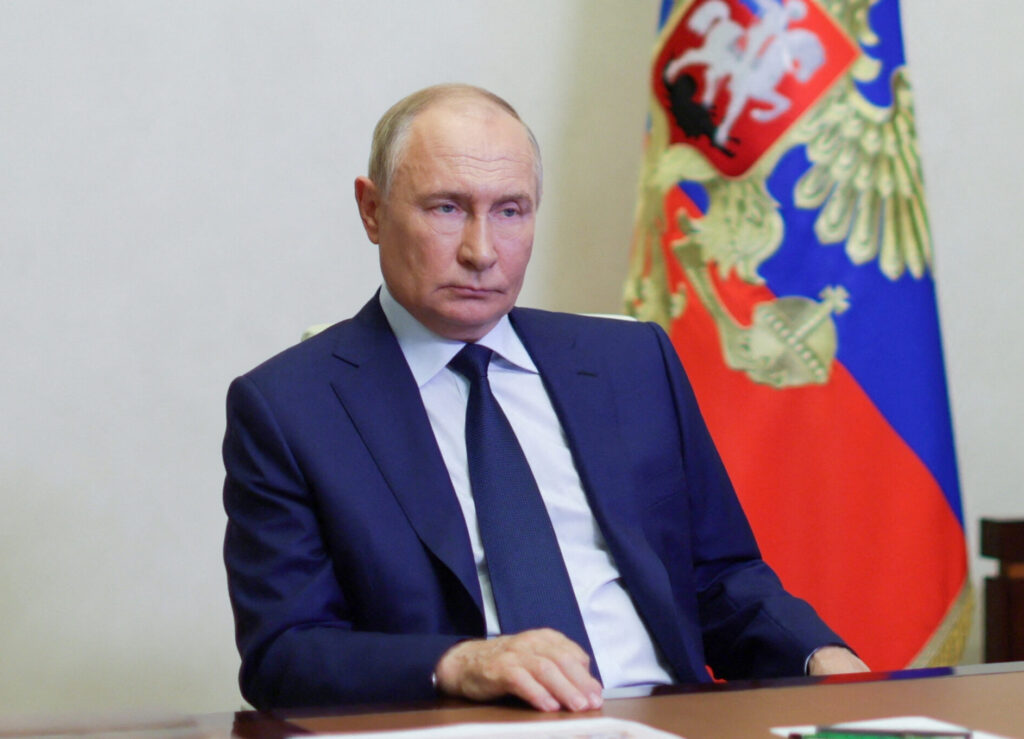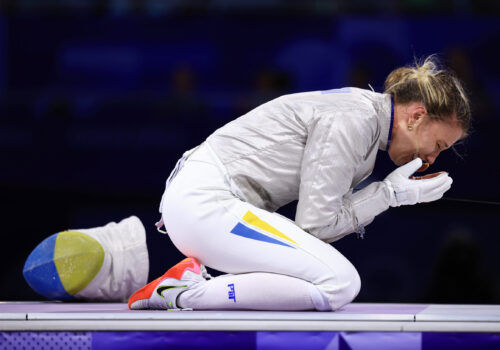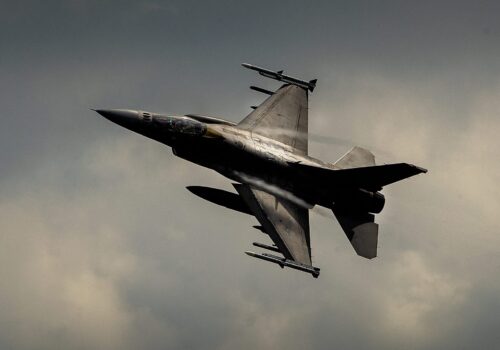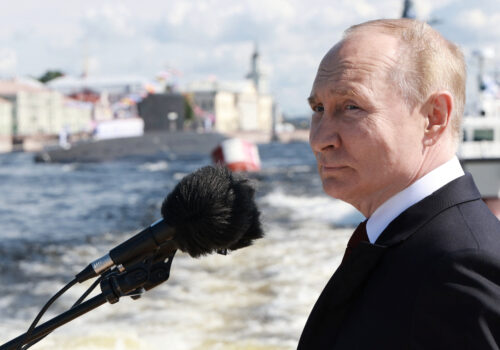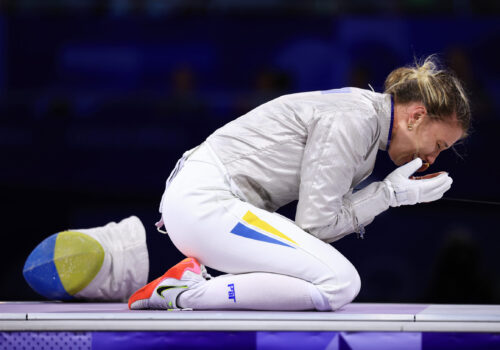
Ukraine’s invasion of Russia is erasing Vladimir Putin’s last red lines
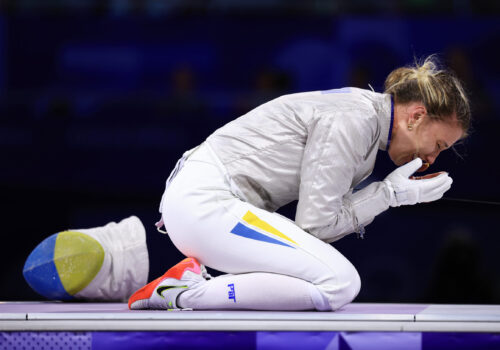
In the early hours of August 6, units of the Ukrainian army crossed the border into Russia’s Kursk Oblast in a surprise move that ended a two-and-a-half year taboo over military operations on Russian soil. The goals of this ambitious Kursk incursion are still shrouded in mystery and subject to much debate, but it is already clear that Ukraine’s decision to invade Russia has succeeded in making a complete mockery of Vladimir Putin’s red lines and the West’s fears of escalation.
Ukraine’s summer offensive is a watershed moment in the current war and an historic milestone in its own right. For the first time since World War II, Russia has been invaded by a foreign army. Initial reports indicate that this ambitious operation was prepared amid great secrecy over a period of months. Ukraine managed to catch the Russians completely off-guard, with Ukrainian forces advancing tens of kilometers into Kursk Oblast during the first days of the campaign.
Ukraine’s political and military leaders have so far remained remarkably tight-lipped about the invasion, saying very little publicly and providing few details. Nevertheless, it is possible to identify a number of likely objectives.
Ukraine’s most obvious intention is probably to ease the military pressure in the south and east of the country, where Russia has been slowly but steadily advancing in recent months. By attacking across the lightly defended border and seizing Russian territory, Ukrainian commanders believe they can force the Kremlin to withdraw troops from the front lines of the war in Ukraine in order to redeploy them for the defense of Russia itself.
The offensive also creates opportunities for Ukraine to regain the military initiative after a year of costly and demoralizing defensive operations. It has long been obvious that Ukraine cannot realistically hope to win a war of attrition against the far larger and wealthier Russian Federation. Kyiv’s best chance of military success lies in returning to a war of mobility and maneuver that allows Ukrainian commanders to take advantage of their relative agility while exploiting the Russian army’s far more cumbersome decision-making processes. This is exactly what the invasion of Kursk Oblast has achieved.
In psychological terms, bringing the war home to Russia has allowed Ukraine to strike a powerful blow against enemy morale. The Ukrainian army’s advances in Kursk Oblast are spreading panic throughout the surrounding region and undermining Putin’s efforts to prevent the invasion of Ukraine from disrupting the daily lives of ordinary Russians. On the home front, Ukraine’s surprise summer offensive has provided Ukrainian society with a desperately needed morale boost, reviving hopes that the war-weary nation can still achieve meaningful military success.
The Kursk offensive may ultimately be part of Ukraine’s preparations for a future peace process, with Kyiv looking to occupy as much Russian territory as possible to use as a bargaining chip in any negotiations with the Kremlin. Indeed, during the initial days of the invasion, there was widespread speculation that Ukraine’s primary target may be the Kursk nuclear power plant, with a view to trading it for the Russian-occupied Zaporizhzhia nuclear power plant in southern Ukraine. An eventual land swap on a far larger scale may be part of Kyiv’s calculations.
Stay updated
As the world watches the Russian invasion of Ukraine unfold, UkraineAlert delivers the best Atlantic Council expert insight and analysis on Ukraine twice a week directly to your inbox.
The Ukrainian army’s advance into Russia has profound implications for perceptions of the war. It directly challenges the widespread belief that Russia’s invasion has reached a stalemate and can no longer be decided on the battlefield. Crucially, it also exposes the emptiness of Vladimir Putin’s red lines and the folly of the West’s emphasis on escalation management.
Ever since the Russian invasion of Ukraine began in February 2022, the international response has been hindered by fear of escalation. Western leaders have allowed themselves to be intimidated by Putin, who has used thinly veiled nuclear threats and frequent talk of Russian red lines to restrict the flow of military aid and convince Ukraine’s partners to impose absurd restrictions on the use of Western weapons inside Russia. As a result, Ukraine has effectively been forced to wage war with one hand tied behind its back.
Ukraine’s offensive is now posing serious questions about the credibility of Russia’s saber-rattling and the rationality behind the West’s abundance of caution. After all, the Ukrainian army’s current invasion of Russia is surely the reddest of all red lines. If Russia was at all serious about a possible nuclear escalation, this would be the moment to make good on its many threats. In fact, Putin has responded by seeking to downplay the invasion while pretending that everything is still going according to plan.
In his first public statement following the start of Ukraine’s invasion, Putin euphemistically referred to it as a “large-scale provocation,” a phrase that seemed specially tailored to disguise the gravity of the situation. The Kremlin then declared a “state of emergency” in Kursk Oblast, which was subsequently upgraded to a “counter-terrorism operation.” The difference between this restrained law-and-order language and the usual soundbites trumpeting existential war with NATO could hardly have been starker.
Russian propagandists have adopted an equally low-key approach. There have been no appeals to the Russian people or attempts to rally the country against the invader. On the contrary, the Kremlin media has reportedly received instructions to avoid “stirring up the situation,” while Russian officials have been told to refrain from commenting on developments in the Kursk region altogether. These are most definitely not the actions of a self-confident military superpower on the verge of a major escalation.
Eurasia Center events
What we are currently witnessing is entirely in line with a well-established pattern of Russian threats being exposed as bluffs by Ukrainian boldness. During the first year of the war as Putin prepared to announce the annexation of occupied Ukrainian city Kherson, he warned that any attempt to reclaim this “Russian land” would result in a nuclear reply. “I’m not bluffing,” he famously declared. But when Ukraine liberated Kherson just weeks later, Putin did not reach for the nuclear button. Instead, he ordered his beaten troops to quietly retreat.
Russia’s reaction to wartime setbacks in Crimea has been similarly underwhelming. The 2014 seizure of the Ukrainian peninsula remains Putin’s crowning glory and serves as the basis for his claim to a place in Russian history alongside the country’s greatest rulers. Nevertheless, when Ukraine deployed missiles and marine drones to sink or disable around one-third of the entire Russian Black Sea Fleet, there was no apocalyptic response from the Kremlin. On the contrary, Putin instructed his remaining warships to withdraw from Crimea and seek safety in Russian ports.
This record of inglorious Russian retreats makes the West’s frequently voiced fear of escalation all the more difficult to justify. Ukrainians will now be hoping Putin’s characteristically weak response to the Kursk offensive can persuade Western leaders to belatedly abandon their failed policies of escalation management and acknowledge that the quickest way to end the war is by arming Ukraine for victory.
There are some indications that attitudes among Ukraine’s Western allies may finally be changing. The EU has led the way, with European Commission spokesperson Peter Thano responding to the Ukrainian cross-border push into Kursk Oblast by saying Ukraine has the “legitimate right” to defend itself, including inside Russia. Berlin has reacted in the same manner, with the German Foreign Ministry issuing a statement confirming that Ukraine’s right to self defense “is not limited to its own territory.” Meanwhile, US officials have also signaled their approval. “Ukraine is doing what it needs to do to be successful on the battlefield,” commented a Pentagon official.
This broadly supportive international reaction is welcome news for Ukraine, but officials in Kyiv are also well aware that further steps are required in order to set the stage for Putin’s eventual defeat. Ukrainian President Volodymyr Zelenskyy underlined this point in his August 11 evening address, when he once again called for the lifting of all Western restrictions on long-range strikes against military targets in Russia. Until that happens, Moscow will retain the ability to pummel Ukrainian cities at will and Putin will have little reason to end his invasion.
The West has spent more than two years slow-walking military aid to Ukraine for fear of provoking Putin. And yet time after time, Ukraine has proved that whenever the Russian dictator is confronted with the prospect of defeat, he is far more likely to retreat than escalate. Now that the Ukrainian military has crossed the last of Putin’s red lines and invaded Russia without sparking World War III, there are no more excuses for restricting Kyiv’s ability to defend itself or denying Ukraine the weapons it needs to win the war.
Peter Dickinson is editor of the Atlantic Council’s UkraineAlert service.
Further reading
The views expressed in UkraineAlert are solely those of the authors and do not necessarily reflect the views of the Atlantic Council, its staff, or its supporters.

The Eurasia Center’s mission is to enhance transatlantic cooperation in promoting stability, democratic values and prosperity in Eurasia, from Eastern Europe and Turkey in the West to the Caucasus, Russia and Central Asia in the East.
Follow us on social media
and support our work
Image: Russia’s President Vladimir Putin speaks with Acting Governor of the Kursk region Alexei Smirnov via a video link outside Moscow, Russia. August 8, 2024. (Sputnik/Gavriil Grigorov/Kremlin via REUTERS)
